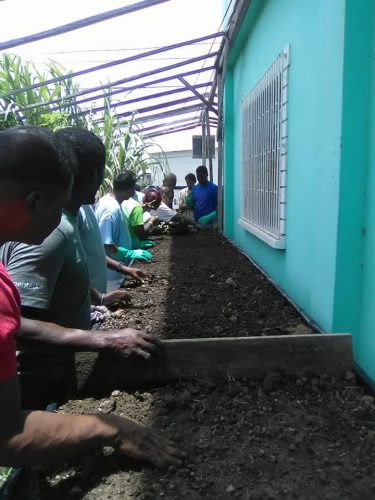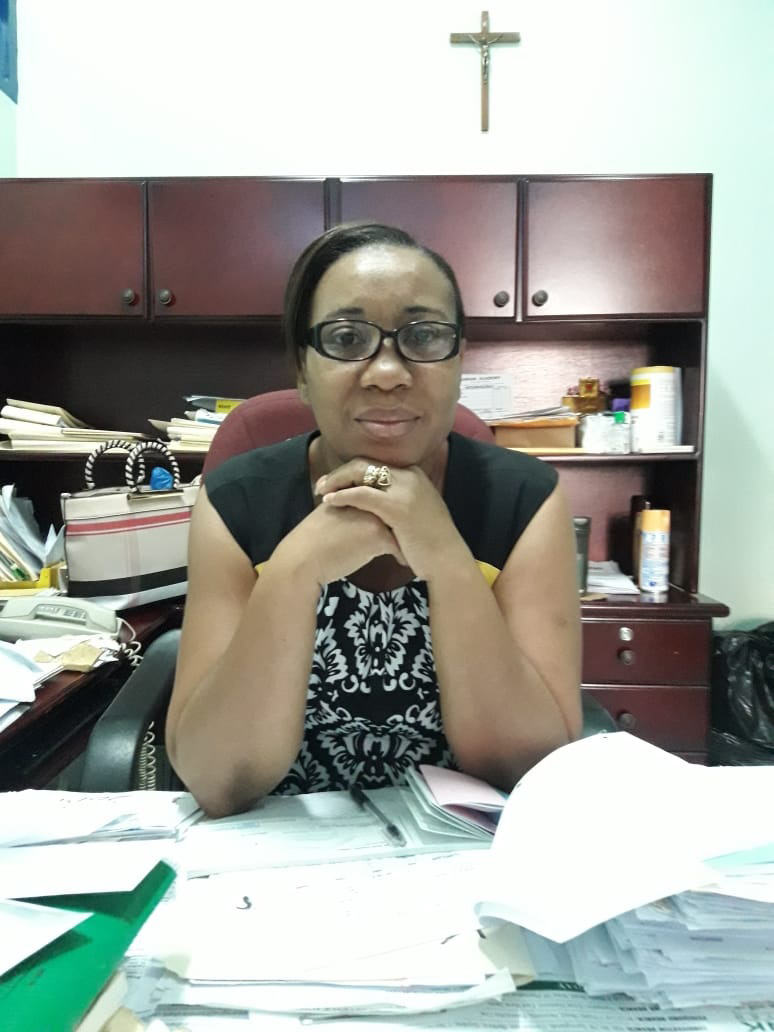Samantha Young has never used drugs or alcohol, but she has seen and experienced the debilitating and sometimes horrific effects of substance abuse. Her father was a chronic alcohol user, who ensured that his wife and 12 children never had a peaceful Christmas while he was alive; three of her siblings were substance abusers who eventually lost their battles and more recently a nephew was killed in the National Psychiatric Hospital in Fort Canje, Berbice.
When Young met and married her husband Clarence, he was already on the road to recovery, but his struggles as an addict were shared with her. Fear that he would relapse when he lost his job saw her make a decision many might think strange. Nineteen years ago, she allowed a recovering drug addict to move into their Hadfield Street, Lodge home while her husband worked with him on the road to recovery.
She was heavily pregnant at the time, but she knew what her husband needed. From that one patient and later more, still in their home, the Phoenix Recovery Project Treatment and Rehabilitation Centre was birthed.

Today it is one of the few programmes offering rehabilitation services to persons who are addicted to drugs and alcohol and it is the only programme that caters for women.
The story of the recovery project has been told many times before, but by Clarence Young. Sadly, two years ago, Clarence passed away and one of his wishes was for his wife to not allow the programme to die with him.
It was not a difficult decision and today Young, the co-founder and CEO of the programme, who also holds the position of Business Manager of Marian Academy, continues to the vision the couple birthed in their home and hopes that one day their legacy will be continued by their two children.
‘Trauma of drug addiction’
“Three of my siblings were all hooked on crack cocaine and they died as a result of that lifestyle. And that is why to some degree I have that empathy for those persons, and I will keep the doors of Phoenix open because I had an option to close it,” Young told Stabroek Weekend in a recent candid interview.
She spoke of the recent painful loss of her sister’s only child due to addiction. Stabroek News had reported in June that 29-year-old Stephan Francis, of Lot 67 Public Road, Kitty, Georgetown, succumbed after he sustained an injury to his head. Authorities at the National Psychiatric Hospital had said there was a scuffle between patients, leading to Francis falling and hitting his head. He sustained a wound and later died.
“I tell people I never used drugs but I have had the trauma of it from beginning to end because our father was an alcoholic… we never knew what it was to have a peaceful Christmas … as the devil would have it then, he [would] go to festivities and come home drunk and that was the end of everything,” she shared.
That was not all. As a child, Young said, she saw, “abuse to the max on my poor mother” and a combination of that and her father’s addiction must have contributed to more than half of her siblings being hooked on “some kind of substance” but three were hooked on crack cocaine.
She believes she would have fallen prey to this as well had she not, from a young age, held on to her religious beliefs as a Seventh-day Adventist. “That is why I held on to God and the Adventist message because the church has really helped me to be who I am today. I was very active in the youth programme and work and today I can say to any young person… hold on to Jesus because I did it and here I am today.”
Apart from the addictions, Young said, all around her the impact of social ills was evident and she had to resolve in her mind that she did not want to take those similar paths.
Talking about the death of her siblings, Young said one brother died from an illness he contracted because of his lifestyle as an addict. Her eldest brother was on the road to recovery when he was diagnosed with kidney cancer in the late stage.
Her sister died from a ruptured appendix, she said, “at the gate of a drug block. She just braced herself to the fence, put her feet over the drain and sat there and died.”
Young said her mother was a very strong and prayerful woman even as she experienced the pain of watching some of her offspring being sucked into the life of addiction.
“I know the pain of families because during our siblings’ crises they had brought us to rock bottom…When a mother comes and says so, I know because I walked that road and it was for many years,” she said.
Even after she got married and left the family home, Young said, it still did “not give me freedom from them because they came. Sometimes you went home, your clothesline clean, they took your clothes and gone.”
‘Help me’
Her late husband Clarence Young worked with the Salvation Army but later lost that

job and while he was at home, she said, with the frustration of not working she saw signs that he could relapse. At the time, he had one patient he was working with, but the person was hospitalised, and it was on her suggestion that the client was offered a place in their home. From that one, the clientele moved to four persons they could have accommodated at once.
But with one child, another on the way and the clientele growing, more space was needed and eventually they rented a house in Sparendaam and increased their clientele from four to 12, all men. The family lived in the top half of the house while the clients were downstairs, but they shared the kitchen.
Young said when she cooked, the clients would be in the kitchen with her helping her to prepare meals. “They would help me feed the children,” she said.
At no time was she scared of the clients and the family never had any bad experiences while they lived with them and their children interacted with them.
“We never had any issues. But after a while we saw the need to move away the children because when they had support meetings the clients were allowed to express themselves freely and my little boy was coming and listening so we said we have to leave,” she said about the family’s move to another location.
The children still have relationships with some of the clients who lived with the family.
Women
The idea of treating women was suggested by a friend but when Young broached the subject with her husband, he immediately turned it down.
“I said to him you have to do this female programme, because at that time I had a sister who was also on crack cocaine and I needed help for her. And then he said he would think about it and eventually he took up the challenge,” she recalled.
They got the funding but had the challenge of finding a venue. Then they found the Mon Repos location. Next door was an empty building and following enquiries they managed to rent that as well. As a result, the men were also moved to that location.
While Young was happy when they opened the doors to women, it was heartrending that her sister, whom she really wanted to help, died a month before.
“She never got the opportunity to benefit,” she said. Young recalled that persons her sister knew told them that they noticed that she was not well, and they encouraged her to go home since at the time she juggled between home and the streets.
“She said she wanted one more and I say to clients today, one more could determine if you live or die. She said one more…,” she said as she trailed off.
Young thinks it is time for the women and men in treatment to be separated and as a result her agenda includes finding another location for them and she hopes this could be done soon.
Young remembered that even though her now deceased husband was living in Guyana she had not met him here, but in Trinidad while she was studying. She shared that she herself is Trinidadian by descent because her father was born in that country. The couple later married.
Over the years, he made it easier for her to understand more about addiction and as a couple they shared their working days with each other, so she knew what was happening at the project even though she was not there most of the time.
Young said the name Phoenix came from a painting her husband had done of the mythical bird that obtains new life by rising from the ashes of its predecessor, just before he left the rehabilitation centre he was at in Trinidad. Young said she found the painting among a pile of things her husband’s mother was about to throw out and knowing what it stood for she returned it to him and told him the project would be named Phoenix.
Looking to the future, Young said she wants to see the project to a higher level being “a lovely building or two on a
massive stretch of land. My goal is to complete the dream of removing the women [from proximity to the men] and then the possibility of getting additional land to relocate the men,” she said.
She said as long as she is alive Phoenix will remain open and she is preparing her children to take up the mantle as she recalled that their father always assigned them tasks involving the project.
For the first time this year, the project received a government subvention and Young expressed gratitude and the hope that it can continue as it helped with adequately staffing the programme. She also expressed gratitude to the many donors who have been supporting in cash and kind over the many years and some of these include Bounty Farms, Banks DIH, Sterling Products, Guyana Beverages, Guyana Rice Development Board, Ansa McAl, Noble House Seafood, NAMILCO, and Toucan, among many others. The project has many volunteers and is assisted with horticultural therapy through NAREI with the small garden they have and a volunteer.
The board of directors is very vibrant and assists in the running of the programme.
The project is now also part of the Drug Treatment Court and Young said it is not something new as in the past Phoenix worked with families who did not want to press charges against their relatives if they opted for treatment.
One of the new challenges is “dual diagnosis” in that persons are addicted and also have mental disorder. For this, Phoenix works along with the Georgetown Hospital Psychiatric Department and these persons are treated and may be kept for a few days. But there are times when space is an issue and the project has to take on the responsibility of keeping them until they attain some stability before they can start the recovery path.
“We have had challenging days, but we are hoping for better days,” Young said, adding that there are many success stories of persons who were helped and returned to contributing positively to society. But there are others who relapsed as well.
“Clarence used to always say in this life you help some and you lose some,” she said.
Phoenix is located at 90 Block CC Mon Repos, East Coast Demerara. The telephone numbers are 220-6825 and 660-4612 and contact can also be made through email addresses rsyoung3056636@yahoo.com and prpsarx@yahoo.com.

